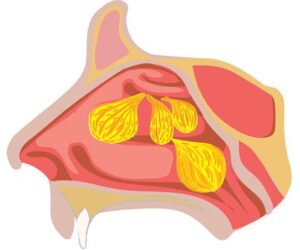Nasal Polyps
Nasal polyps are soft, noncancerous growths that develop in the lining of the nasal passages or  sinuses. They are typically painless and have a teardrop or grape-like shape. Nasal polyps are often associated with chronic inflammation of the nasal passages, a condition called chronic rhinosinusitis with nasal polyps.
The exact cause of nasal polyps is not fully understood, but they are believed to result from chronic inflammation and irritation of the nasal and sinus tissues.
sinuses. They are typically painless and have a teardrop or grape-like shape. Nasal polyps are often associated with chronic inflammation of the nasal passages, a condition called chronic rhinosinusitis with nasal polyps.
The exact cause of nasal polyps is not fully understood, but they are believed to result from chronic inflammation and irritation of the nasal and sinus tissues.
 sinuses. They are typically painless and have a teardrop or grape-like shape. Nasal polyps are often associated with chronic inflammation of the nasal passages, a condition called chronic rhinosinusitis with nasal polyps.
The exact cause of nasal polyps is not fully understood, but they are believed to result from chronic inflammation and irritation of the nasal and sinus tissues.
sinuses. They are typically painless and have a teardrop or grape-like shape. Nasal polyps are often associated with chronic inflammation of the nasal passages, a condition called chronic rhinosinusitis with nasal polyps.
The exact cause of nasal polyps is not fully understood, but they are believed to result from chronic inflammation and irritation of the nasal and sinus tissues. Causes
1. Chronic rhinosinusitis:
Nasal polyps are commonly associated with chronic rhinosinusitis, which is a persistent inflammation and infection of the nasal and sinus cavities. The exact cause of chronic rhinosinusitis is multifactorial, involving a combination of genetic predisposition, environmental factors, and immune system dysfunction.
2. Allergic rhinitis:
Allergies, particularly allergic rhinitis (hay fever), can contribute to nasal inflammation and the development of polyps in some individuals. The allergens responsible may include dust mites, pollen, animal dander, or certain foods.
3. Asthma:
There is a strong association between nasal polyps and asthma. People with asthma are more likely to develop nasal polyps, and the presence of nasal polyps can worsen asthma symptoms.
4. Aspirin sensitivity:
Some individuals with nasal polyps may have a sensitivity to aspirin or other nonsteroidal anti-inflammatory drugs (NSAIDs). This condition, known as aspirin-exacerbated respiratory disease (AERD) or Samter’s triad, is characterized by the combination of nasal polyps, asthma, and aspirin sensitivity.
5. Genetic factors:
There may be a genetic predisposition to developing nasal polyps. Certain genetic variations and family history of nasal polyps can increase the likelihood of developing the condition.
6. Environmental factors:
Exposure to irritants and pollutants, such as air pollution, tobacco smoke, chemical fumes, and occupational hazards, may contribute to chronic nasal inflammation and the development of polyps.
Symptoms
1. Nasal congestion and blockage:Nasal polyps can cause persistent nasal congestion and a feeling of stuffiness. This can make it difficult to breathe through the nose.
2. Decreased or loss of sense of smell (hyposmia or anosmia):
Nasal polyps can affect the olfactory receptors responsible for the sense of smell, leading to a reduced ability to smell or a complete loss of smell.
3. Runny nose or postnasal drip:
Nasal polyps can trigger excessive mucus production, resulting in a runny nose or a sensation of mucus dripping down the back of the throat (postnasal drip).
4. Facial pain or pressure:
Large or numerous nasal polyps can cause pain or pressure in the face, particularly around the area of the sinuses.
5. Sinus infections (sinusitis):
Nasal polyps can obstruct the sinuses and interfere with normal sinus drainage, leading to recurrent or chronic sinus infections. Symptoms of sinusitis may include facial pain, headache, pressure, thick nasal discharge, and fatigue.
6. Snoring or sleep apnea:
Nasal polyps can contribute to airway obstruction, leading to snoring or potentially obstructive sleep apnea, a condition characterized by pauses in breathing during sleep.
7. Itching around the eyes:
Some individuals with nasal polyps may experience itching or discomfort around the eyes due to the associated inflammation.
Preventions
1. Manage underlying conditions:
Properly manage conditions that are associated with nasal polyps, such as allergic rhinitis and asthma. Work with your healthcare provider to develop an effective treatment plan to control symptoms and reduce inflammation.
2. Allergy management:
If you have known allergies, take steps to minimize your exposure to allergens that trigger your symptoms. This may include using air purifiers, dust mite covers, and regularly cleaning your living environment.
3. Nasal hygiene:
Practice good nasal hygiene to reduce the risk of nasal infections and inflammation. This includes regularly rinsing your nasal passages with saline solution or using nasal irrigation systems to keep your nasal passages clean and moisturized.
4. Avoid irritants:
Minimize exposure to irritants that can contribute to nasal inflammation, such as tobacco smoke, air pollution, chemical fumes, and occupational hazards. Take necessary precautions to protect your respiratory system in such environments.
5. Maintain a healthy lifestyle:
Adopting a healthy lifestyle can support overall well-being and potentially reduce the risk or severity of nasal polyps. This includes maintaining a balanced diet, regular exercise, adequate sleep, and stress management.
6. Regular check-ups:
Stay proactive with regular check-ups with your healthcare provider. They can help monitor your nasal and sinus health and identify any changes or early signs of nasal polyps.
7. Treat nasal infections promptly:
If you develop a sinus or respiratory infection, seek prompt treatment to prevent complications and reduce the risk of chronic inflammation that may contribute to nasal polyps.

